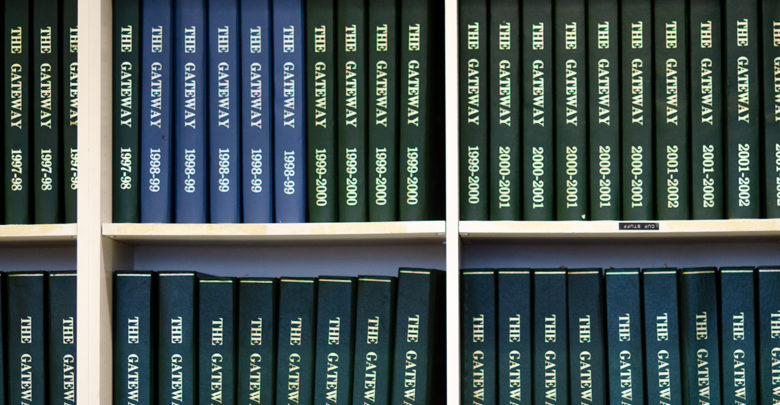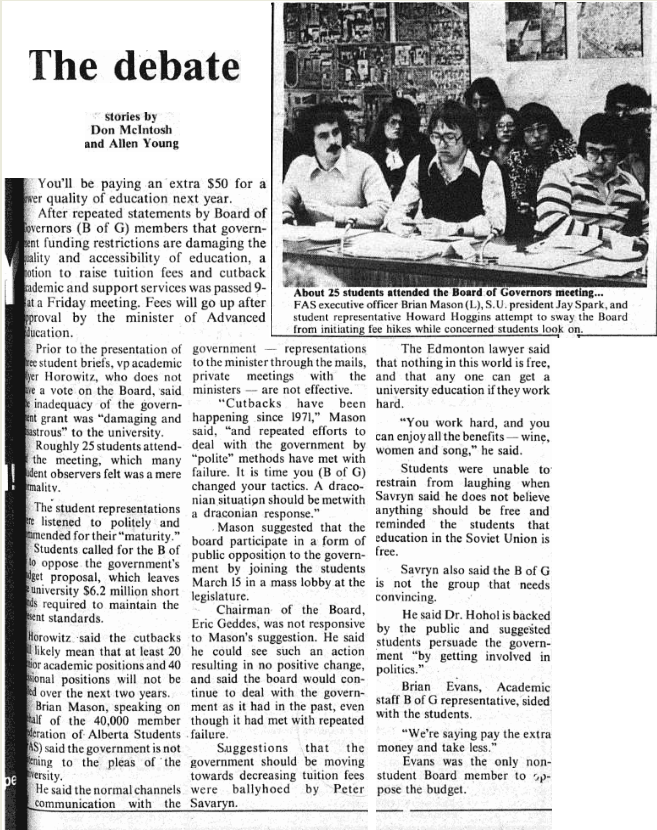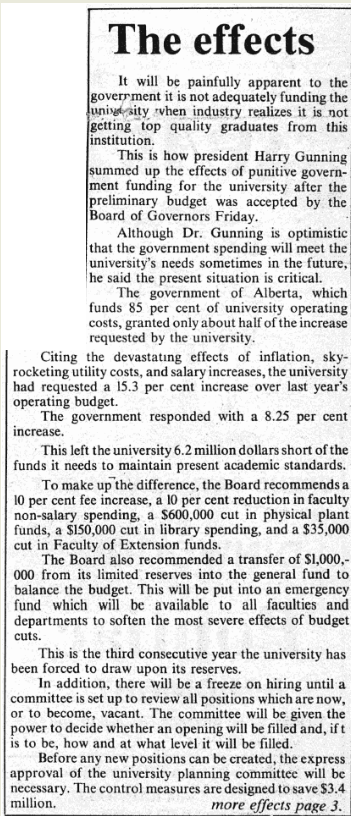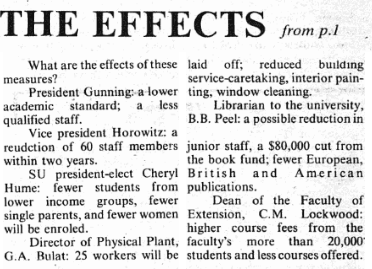From the Archives: “Tuition up, services slashed”
Tuition, while not set for the next academic year yet, is likely to also increase — albeit more than $50
 Helen Zhang
Helen ZhangFrom the Archives is The Gateway’s ongoing series of recounting historical articles written by the publication from years past.
As the university faces a changing provincial funding landscape, The Gateway’s latest iteration in its series of From the Archives includes an article surrounding the 1978 Board of Governors raising tuition.
The board — the highest decision-making body at the University of Alberta — at that time raised domestic student tuition by $50, after the government cut funding to the U of A. In Budget 2019, the province set that tuition could increase up to a maximum of seven per cent at the institutional level, per year for the next three years. It also cut the level of funding the institution can expect from the province and how future funding contributions will be calculated.
The following article is taken from the March 7, 1978 edition of The Gateway:
By: Don McIntosh and Allen Young
The debate
You’ll be paying an extra $50 for a lower quality of education next year.
After repeated statements by Board of Governors (B of G) members that government funding restrictions are damaging the quality and accessibility of education, a motion to raise tuition fees and cutback academic and support services was passed 9-4 at a Friday meeting. Fees will go up after approval by the Minister of Advanced Education.
Prior to the presentation of three student briefs, vice-president (academic) Myer Horowitz, who does not have a vote on the board, said the inadequacy of the government grant was “damaging and disastrous” to the university.
Roughly 25 students attended the meeting, which many student observers felt was a mere formality.
The student representatives were listened were listened to politely and commended for their “maturity.”
Students called for the Board of Governors to oppose the government’s budget proposal, which leaves the university $6.2 million short of funds required to maintain the present standards.
Horowitz said the cutbacks will likely mean that at least 20 senior academic positions and 40 sessional positions will not be filled over the next two years.
Brian Mason, speaking on behalf of the 40,000 member Federation fo Alberta Students (FAS) said the government is not listening to the pleas of the university.
He said the normal channels of communication with the government — representations to the minster through the mail, private meetings with the minster — are not effective.
“Cutbacks have been happening since 1971,” Mason said, “and repeated efforts to deal with the government by ‘polite’ methods have met with failure. It is time you [Board of Governors] changed your tactics. A draconian situation should be met with a draconian response.”
Mason suggested that the board participate in a form of public opposition to the government by joining the students March 15 in a mass lobby at the legislature.
Chairman of the Board, Eric Geddes, was not responsive to Mason’s suggestion. He said he could see such an action resulting in no positive change, and said the board would continue to deal with the government as it had in the past, even though it had been met with repeated failure.
Suggestions that the government should be moving towards decreasing tuition fees were ballyhooed by Peter Savryn.
The Edmonton lawyer said that nothing in this world is free, and that anyone can get a university education if they work hard.
“You work hard, and you can enjoy all the benefits — wine, women, and song,” her said.
Students were unable to restrain from laughing when Savryn said he does not believe anything should be free and reminded the students that education in the Soviet Union is free.
Savryn also said the Board of Governors is not the group that needs convincing.
He said Dr. Hohol is backed by the public and suggested students persuade the government “by getting involved in politics.”
Brian Evans, academic staff Board of Governors representative, sided with the students.
“We’re saying pay the extra money and take less.”
Evans was the only non-student board member to oppose the budget.
The effects
It will be painfully apparent to the government it is not adequately funding the university when industry realizes it is not getting top quality graduates from this institution.
This is how president Harry Gunning summed up the effects of punitive government funding for the university after the preliminary budget was accepted by the Board of Governors friday.
Although Dr. Gunning is optimistic that the government spending will meet the university’s needs sometimes in the future, he said the present situation is critical.
The Government of Alberta, which funds 85 per cent of university operating costs, granted only about half of the increase requested by the university.
Citing the devastating effects of inflation, sky-rocketing utility costs, and salary increases, the university had requested a 15.3 per cent increase over last year’s operating budget.
The government responded with a 8.25 per cent increase.
This left the university $6.2 million short of the funds it needs to maintain present academic standards.
To make up the difference, the board recommended a 10 per cent fee increase, a 10 per cent reduction in faculty non-salary spending, a $600,000 cut in physical plant funds, a $150,000 cut in library spending, and a $35,000 cut in faculty of extension funds.
The board also recommended a transfer of $1 million from its limited reserves into the general fund to balance the budget. This will be put into an emergency fund which will be available to all faculties and departments to soften the most severe effects of budget cuts.
This is the third consecutive year the university has been forced to draw upon its reserves.
In addition, there will be a freeze on hiring until a committee is set up to review all positions which are now, or to become, vacant. The committee will be filled and, if it is to be, how and at what level it will be filled.
Before any new positions can be created, the express approval of the university planning committee will be necessary. The control measures are designed to save $3.4 million.
What are the effects of these measures?
President Gunning: a lower academic standard; a less qualified staff.
Vice-president (academic) Horowitz: a reduction of 60 staff members within two years.
Students’ Union president-elect Cheryl Hume: fewer students from lower income groups, fewer single parents, and fewer women will be enrolled.
Director of Physical Plant, G. A. Bulat: 25 workers will be laid off; reduced building service-caretaking, interior painting, window cleaning.
Librarian to the university B. B. Peel: a possible reduction in junior staff, a $80,000 cut from the book fund; fewer European, British, and American publications.
Dean of the faculty of extension, C. M. Lockwood: higher course fees from the faculty’s more than 20,000 students and less courses offered.







